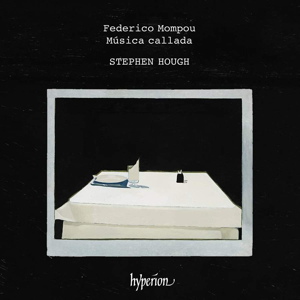
Federico Mompou (1893-1987)
Música callada Books 1-4 (1959-67)
Stephen Hough (piano)
rec. 2020, St Silas the Martyr, Kentish Town, London, UK
Hyperion CDA68362 [69]
Over the years, I have seen a number of reviews on this site praising the piano music of Federico Mompou, especially the four books of Música callada, which can be translated as “Silent Music”. Here are a couple of them to give you some background on the composer and work: review ~ review. I had not heard any of it, so when this new recording hadn’t been picked up by any of my colleagues, I decided it was time to see what the fuss was about. Such an exercise of curiosity has presented me with a quandary, as I’m afraid I didn’t have the same response. I did initially consider asking our distributor of discs whether I should return it or forward to someone else more sympathetic, but decided that it was worth our readership having a counter-opinion on this music.
The four books, written over a decade when Mompou was already in his sixties comprise twenty-eight short pieces, none lasting more than four minutes, and all with slowish tempos. None are given descriptive titles, just tempo indications: Lento is used thirteen times which will give you some indication as to the nature of the music. If you don’t know the music, you might be wondering what is the significance of “silent” in the title. At the simplest level, it is that there are many pauses and rests throughout. There are probably more subtle and symbolic reasons as well. It is not, however, all quiet and meditative: in many of the pieces, a gentle melodic strand will be interrupted by a loud, generally discordant outburst.
This is not a cycle in the normal sense, as there is no musical or thematic connection between the individual pieces, though I have read that there is a progression over the four books akin to a spiritual journey. Books 3 and 4 are mostly devoid of the dissonant eruptions that are dotted throughout the first two, and the music becomes increasingly sparse, with more silence. The length also increases: all the pieces are more than two minutes, whereas in the first two Books, the majority are under two. So one might see this as a gradual development of calm, perhaps spiritual, leaving behind the frustrations of the world.
Erik Satie is often used in reviews as a reference point for Mompou newbies, though that doesn’t help someone like me, as I only know his Gymnopédies. I would see post-WW2 jazz as another signpost, and perhaps if I was more attuned to jazz, I might have warmed to this music more. As it is, I failed to “get” it, and have no real desire to persevere with it. To me, it seemed almost as though the music was being improvised, with no real structure or form, rhyme or reason, and certainly no sense of direction. The dissonant outbursts were another cause for dissatisfaction. I’m sad to say that I found little pleasure anywhere in the sixty-nine minutes, and I noted with interest the closing sentence of a review by Göran Forsling: “I hope my travelogue has provided enough information for readers to decide whether Música callada is for them or whether they should book a different destination.” Clearly, I fall into the latter category.
None of this was the fault of Stephen Hough, one of my favourite pianists. In 1996, Hough recorded a disc of selections of Mompou’s other works for solo piano (Hyperion CDA66963), too early for a MWI review, but it was lauded to the skies by numerous critics. It is, therefore, surprising that almost twenty-five years passed before he returned to the composer, and his best-known work. I compared his playing of a few of the pieces with two other recordings that I could access through the Naxos Music Library – Jenny Lin (Steinway & Sons) and Javier Perianes (Harmonia Mundi) – and had the same reaction to their playing.
If you are a Mompou aficionado, then I am quite sure that you will want Stephen Hough’s traversal of Música callada, but I’m afraid it remained a closed book to me.
David Barker
Help us financially by purchasing from




















